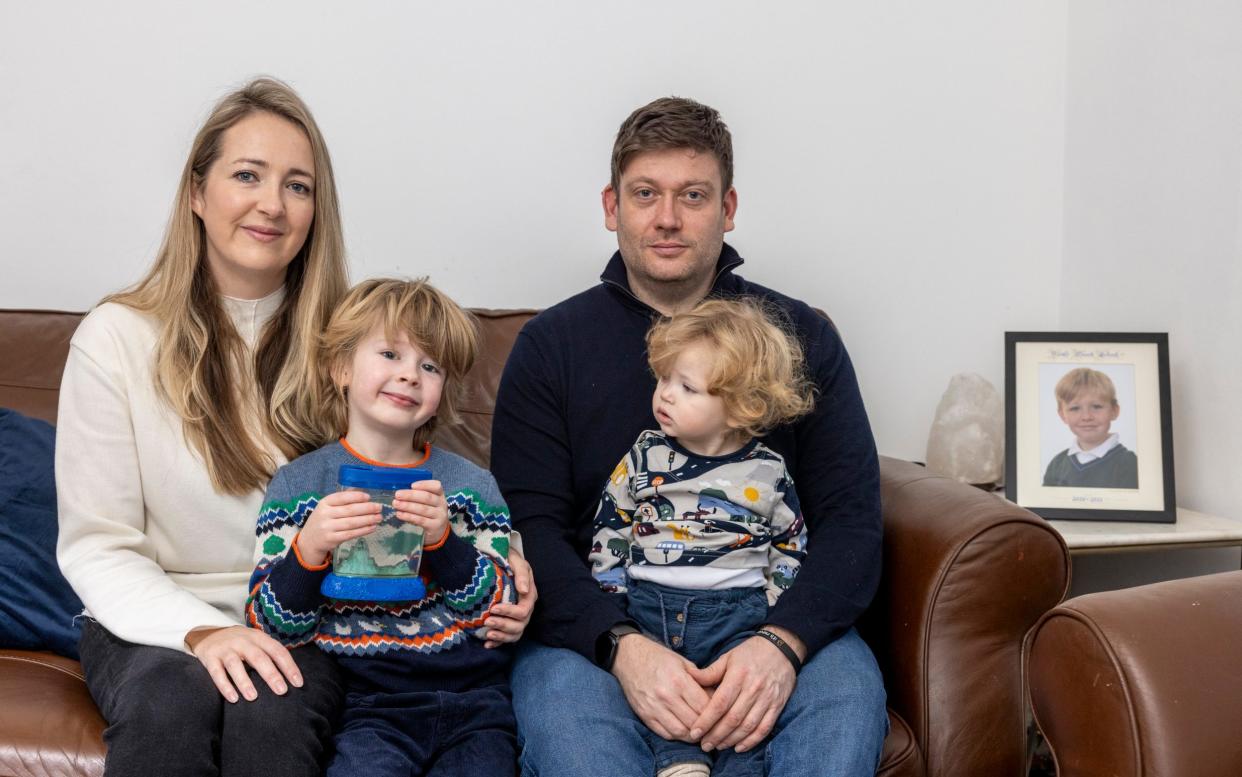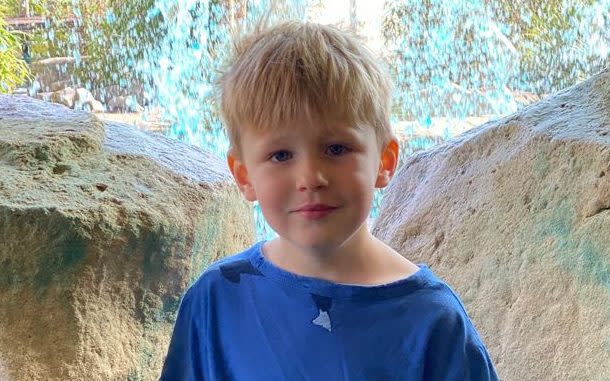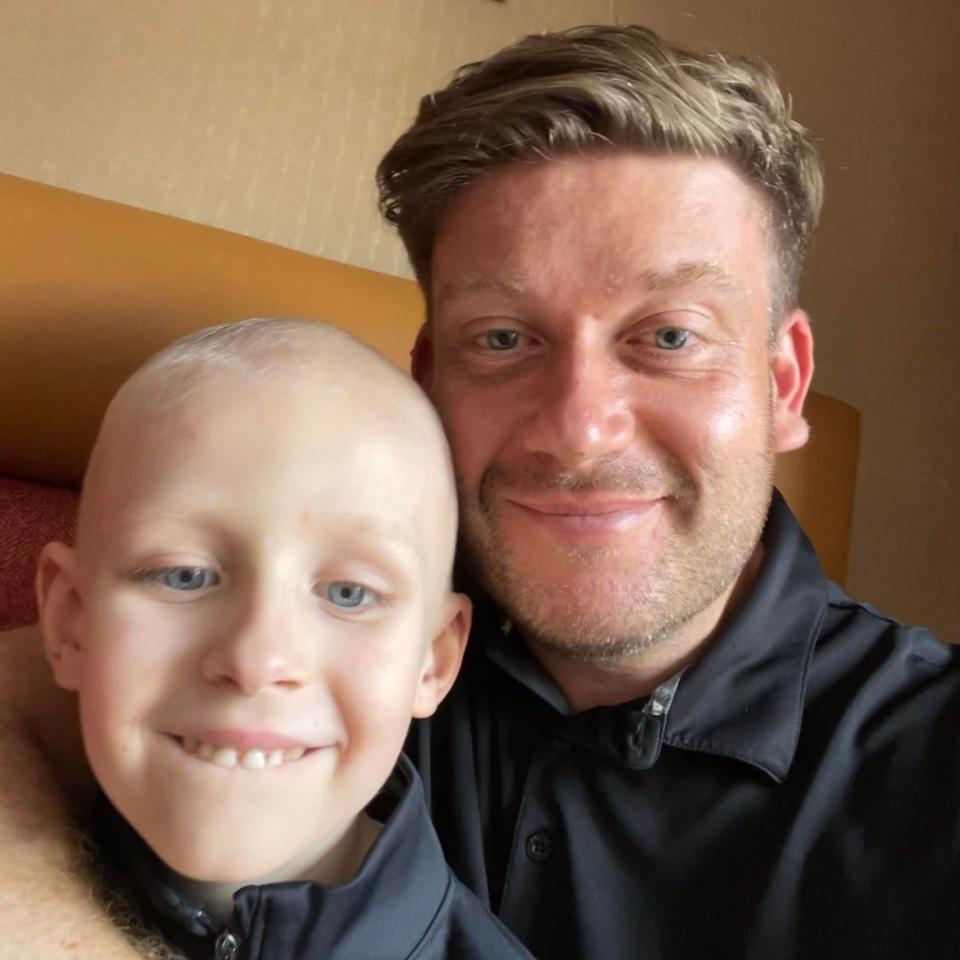‘When our six-year-old son died of cancer, there was no support whatsoever’

When I saw the box of tissues on the oncologist’s table, I knew that we were about to hear the news no parents ever should. There was nothing more that could be done, we were told abruptly, for our six-year-old, Hugh, whose diagnosis with a rare form of cancer had left our bright boy to fade away completely. Ten days later, he was gone.
The first sign that something wasn’t right had been Hugh going off his food 10 months earlier. His energy levels seemed low – noticeable, for a little boy who was always bouncing around the house – and after a few days, his stomach became distended. I’d given him some kefir yogurt a few days earlier, and thought that might have been the cause, and that it would ease off, but my wife, Frances, insisted on taking him to the doctor. Thank God she did. Tests showed that he had Rhabdomyosarcoma, a rare form of cancer that had spread all over his abdomen. It often affects children, and accounts for just 0.04 per cent of cancer cases in the UK, or 112 diagnoses a year.
When you’re told your child has cancer, everything becomes a whirlwind: first, there’s the shock, then the disbelief – we had done everything for our firstborn, from organic foods to private school and lovely holidays, how could this be happening? Then there was the fear. I remember completely going cold, as the worst-case scenario flooded my head.

Hugh began declining rapidly, so doctors suggested the best course of action was six months of intensive chemotherapy at a hospital in Cambridge, 100 miles round-trip from our home in Hertford. It was November 2020, when pandemic restrictions meant that only one of us could be with him at a time, so my wife and I took it in turns, one of us sleeping by his hospital bedside for a few days, while the other looked after his little brother, Raife. He was on the strongest stuff, and it was heart-wrenching watching the medication go in. All we could do was hope desperately that this was going to ensure his survival, rather than leading to one of the numerous awful complications the endless forms we had to sign warned us about.
That it happened during the pandemic meant it was just a completely isolating experience – there was no one you could talk to for reassurance or advice. Frances and I were like ships in the night, barely able to see or speak to one another for the support we so badly needed. It was lonely and mentally overwhelming, but we resolved never to shed a tear in front of Hugh.
Hugh rang the bell on his children’s cancer ward on May 23, 2021, after six months of in-patient care, to signal the end of his invasive treatment and the move to the maintenance phase at home. Our every waking hour went into caring for him: taking him for radiotherapy and checks, four temperature measurements a day, and chopping and changing whenever his blood levels weren’t where they should have been, delaying treatment. We were always waiting for the next thing to hit us, worrying all the time about what the next scan or test might show. The weight on my chest at times was unbearable, as was the relentlessness of it all.

Hugh made it to his sixth birthday on August 30. But he couldn’t stomach his cake, and two weeks later, on the day he was due to return to school, he relapsed. He died on September 18.
That day, just as had been the case since his diagnosis, we were completely alone. There was no support whatsoever available; nor financial help for the 10 months I had spent out of work. My family’s golf business put our staff on furlough during Covid, and there is no way I could have earned a living while being a full-time carer – a thought that led us to set up a charity, It’s Never You, to support parents in that same situation. That was what my wife said to me on the day Hugh was diagnosed – that you always think awful things like this would never happen to you – and it’s one we’ve heard many times over from families in the same terrible position.
There is no dedicated financial safety net (the UK, unlike Denmark, Spain, Germany, France, Sweden, Portugal, Greece and Belgium, offers no help for parents in this position), and trying to navigate the limited allowances you’re entitled to as a carer is incredibly complicated. There are no mental health services provided when you’re told your child is about to die; there wasn’t even food available, often, just the empty shelves of the hospital shop. It left us with so many questions: where was someone to help us? Where was the cushion for the blow? How do we tell our youngest boy that his brother is never coming home? We never received any answers.
Figures show that it costs an average of £730 per month to look after a child in treatment, and on the ward, we had watched other parents making decisions about whether they could afford to eat that day, so heavy is the financial burden. The transport costs, having to buy food out each day, having to pull out of work: the list goes on. One single mother we met had to leave her 13-year-old at home alone overnight, so she could remain in hospital for her youngest’s treatment; another had to sell her home, as she couldn’t maintain her mortgage repayments with spiralling medical costs. One father who came to our charity lost his £75,000pa IT job when his firm refused to allow him the leave he needed.
This pressure being piled on parents at the worst time in their lives makes an unbearable situation more devastating. After Hugh died, my mental health was in pieces – I needed counselling straightaway for PTSD, having seen and heard things that a parent should never have to. After being told the NHS waiting list for treatment was 12 weeks, I again paid out of pocket for the treatment as I was in such a bad way. Without that, I wouldn’t be here now – but spending another £2,000 when we had already lost so much felt seriously wrong.
What parents like us are being put through financially is almost inhumane. That’s why we’re fighting to get Hugh’s Law – which will provide furlough-type payments for parents unable to work during their child’s treatment – through parliament. With the help of our local MP, Sir Oliver Heald, who raised it as a private members’ bill, it will have its second reading on January 19.

It’s given us purpose, fighting for this in the absence of our beloved firstborn, and we have received public backing from the Prime Minister, which has made us optimistic. It’s hard to imagine why any ministers wouldn’t push this through to the consultation stage, though I do worry what might happen to my mental health if they don’t.
For now, we are just trying desperately to keep Hugh’s memory alive, covering our home in photos of him, and watching videos of him dancing through the kitchen, bald-headed, during treatment. A few months ago, we had another son, Jude, and watching him play with Raife so badly reminds us of how the two of them once were – something our now five-year-old no longer remembers. At Christmas, Raife asked whether Hugh was getting presents in heaven, and I told him that his big brother was opening his presents right next to Santa.
When we first lost Hugh, we told Raife that he had become a butterfly and flown off to a new life – the two of them used to love collecting caterpillars (which are all over our golf courses come spring), and releasing them once they were ready. A butterfly is the symbol of our charity, and even now, when Raife sees one, he says: “that’s my brother”.
People say our story is sad, but I no longer see it that way. We know that Hugh’s life will be a positive force, and leave a legacy that changes thousands of lives for good.
As told to Charlotte Lytton
Recommended
Six breakthroughs pushing us closer to a cure for cancer

 Yahoo News
Yahoo News 
